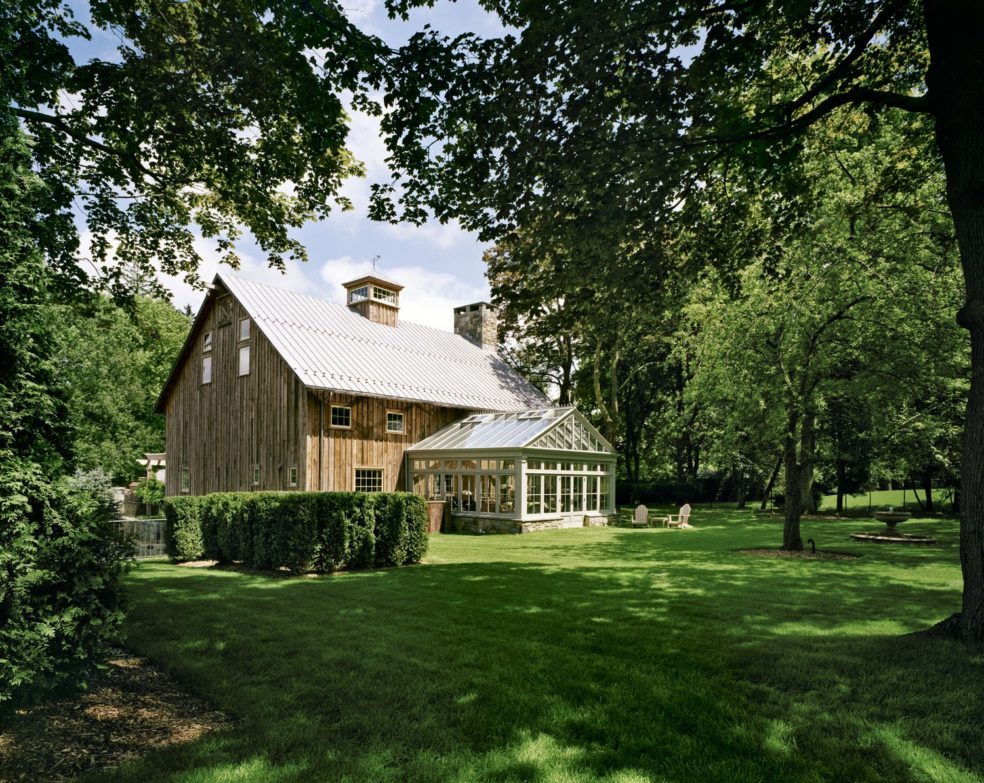 “…More and more people are chasing after the American dream and they are falling into loads of debt because of it. With our business we would like to offer families and individuals a way to downsize and become more financially stable without giving up comfort, style and design.
“…More and more people are chasing after the American dream and they are falling into loads of debt because of it. With our business we would like to offer families and individuals a way to downsize and become more financially stable without giving up comfort, style and design.
If this is a lifestyle that peaks your interest, my wife and I, along with each of us at Wind River Custom Homes would love the chance to work alongside you, develop a relationship, and help you build a home that fits your needs. Feel free to email us with any questions or project ideas you may have!
– Travis Pyke”
https://www.windrivercustomhomes.net

 “This huge, sawn-timber hay barn was originally built circa 1870. The flooring, ceiling and exterior siding are vintage reclaimed barn boards. The restored barn is now a guest house, garage and wine cellar for a residential estate in southwestern Connecticut.”
“This huge, sawn-timber hay barn was originally built circa 1870. The flooring, ceiling and exterior siding are vintage reclaimed barn boards. The restored barn is now a guest house, garage and wine cellar for a residential estate in southwestern Connecticut.”
Click here for a bunch of photos.




 From top down:
From top down:
-Elegant steep gable house on 28th Ave near Balboa in SF. How come you never see anything this cool in Dwell Magazine?
-House frame in Vallejo, hip roof, nice little understated dormer. You can learn a lot just studying this nicely-proportioned frame.
-If you remember when skateboards were like this, you are pretty old. In the 40s we used to take apart clamp-on-to-yr.-shoe skates and nail them on a piece of wood. This is in the window at The Purple Skunk Skate on Geary Blvd. in SF.
-Ducati on street in SF. I like seeing the frame, as with the house in Vallejo.
-Bambi Airstream, obviously a new one, Novato
Boy, I love getting out and around, shooting pics.
 Hi,
Hi,
Thought you might enjoy seeing an example of a hand crafted wood stove – made by Tim Biggins on Hornby Island BC. Several of Tim’s stoves were featured in the Builders of the Pacific Coast book. This body is made of three truck rims, the door is made from the round end of a propane tank and the base is a huge block (pulley) from a spar tree. 30 years old and still keeping us warm.
-Don Peterson
 “Hi Lloyd,
“Hi Lloyd,
I’m writing for a couple of reasons. First is to say thanks for all the inspiration and information.
In 2007 a friend gave us a copy of Homework. Thus began our quest to find our own little piece of the earth to create our idealized “artist playground.” Sometimes we would lose faith and moan “Why can’t it still be the 1970s so we could just go out and find an old farm that no one wants anymore. If only we had a time machine!” Along the way we picked up a copy of Shelter and then things really kicked in. Our senses of belief, freedom and possibility where bolstered and we plowed on through the seemingly endless array of realty jargon, money questions and what-the-hell-are-we-doing moments.
Read More …
“Was curious if any have used metal quonset buildings as residences.. Here’s one in the Canadian Kootenays ( BC )…Flickr link for current photos…looks great..…
Mike W”
Original alert from Tiny House News.
Every day over 3 billion people in the developing world cook food on open fires or inefficient cook stoves fueled by coal or solid biomass, jeopardize human health, contribute to household & community air pollution, and impact environmental devastation by depleting forests and increasing soil erosion. 4 million premature deaths occur every year due to exposure from toxic smoke emissions. Consequently women and children are disproportionately impacted by household air pollution.
Click here.
Mike W
 “…Maxime Qavtaradze is literally close to the heavens. The 59-year-old monk lives atop a stone pillar in Georgia, scaling a 131-foot ladder in order to leave and enter his lofty home, reports CNN. Photographer Amos Chapple ascended the cliff to photograph his life there.
“…Maxime Qavtaradze is literally close to the heavens. The 59-year-old monk lives atop a stone pillar in Georgia, scaling a 131-foot ladder in order to leave and enter his lofty home, reports CNN. Photographer Amos Chapple ascended the cliff to photograph his life there.
The Katskhi Pillar has long been venerated by locals in the area, though it’s been uninhabited since around the 1400s. When climbers ascended for the first time in centuries in 1944, they found the ruins of a church and the 600-year-old bones of the last stylite who lived there.
The stylite tradition is believed to have begun in 423 when St. Simeon the Elder climbed a pillar in Syria in order to avoid worldly temptations, but the practice has since fallen out of favor. However, Qavtaradze is a modern devotee.
Though isolated, he is not a total hermit, coming down once or twice a week to counsel the troubled young men who come to the monastery at the bottom for his help. After all, he was once one of them. Though he now lives at the top of the world, Qavtaradze found his vocation when he was the lowest he’s ever been, doing prison time after he ‘drank, sold drugs, everything’ as a young man.…”
Click here.
From Evan Kahn
 Photo by Tom Raftery
Photo by Tom Raftery
This is one of many great photos on Treehugger’s Photo Pool:
If you don’t already know about it, TreeHugger is a great website/blog.
 Over the years we’ve had many translations done of our fitness books. For example, Stretching is in 23 languages.
Over the years we’ve had many translations done of our fitness books. For example, Stretching is in 23 languages.
Less so for our building books. In the mid-’70s, Shelter was translated into Spanish, French and German.
In recent years, we’ve had a bunch of our building books translated. Shown here, left-to-right:
–Tiny Homes in Korean
–Builders of the Pacific Coast in Korean
–Homework in Japanese
–Homework in French
–Homework in Korean
–Shelter in Korean
–Shelter in French
–Shelter in German
–Shelter in Japanese
–Shelter in Spanish
Almost all of our books have been translated into Korean, for some reason.
Each of our contracts with foreign publishers has a clause that says they can make no changes in the general layout or the cover. When we got the Korean version of Builders of the Pacific Coast, they had completely redesigned the book and its cover. It was totally different! And guess what — I loved it! — and emailed them to tell them so. Like the French did with Shelter in the ’70s, they understood the spirit of the book and interpreted it for their readers. Wonderful.
 “…More and more people are chasing after the American dream and they are falling into loads of debt because of it. With our business we would like to offer families and individuals a way to downsize and become more financially stable without giving up comfort, style and design.
“…More and more people are chasing after the American dream and they are falling into loads of debt because of it. With our business we would like to offer families and individuals a way to downsize and become more financially stable without giving up comfort, style and design.












